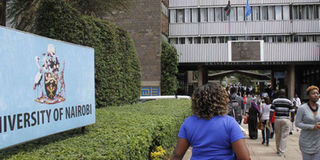Lessons for Kenya from South Africa on funding and research support

Students walk in and out of the University of Nairobi on April 14, 2014. The South African corporate sector is much more involved in university education than the Kenyan one. PHOTO | JEFF ANGOTE | NATION MEDIA GROUP
What you need to know:
- South African universities enjoy a much better learning and teaching ecology in comparison with peers on the continent.
- South African students can expect to be supported to attend international conferences and summer schools abroad if they have bankable ideas.
According to the 2017 Times Higher Education World University Rankings, seven South African universities are placed in the top 10 category in Africa.
Four of the top five universities are also South African, Uganda’s Makerere University being the fifth. No Kenyan university ranks in these categories.
Despite the criticism levelled at most world university rankings, it is a fair indicator of what is right or wrong with these institutions.
Understandably, South African universities enjoy a much better learning and teaching ecology in comparison with peers on the continent.
QUALITY EDUCATION
Still, with the many problems that the Kenyan university system faces, the honchos vested with the responsibility of enhancing university education are better off taking modest steps to emulate the factors that make South African higher education leaders on the continent.
It would be a major step forward if the University of Nairobi, Kenyatta University, Egerton University, Moi University and others upped their game in competition with the University of Pretoria, Stellenbosch University, the University of Kwa Zulu Natal, the University of Johannesburg and other South African institutions.
Indeed an indication that Kenya should look to South Africa is not only because both countries are within the African context.
Thousands of Kenyan students have elected to study in South Africa to escape the structural vagaries that afflict the Kenyan higher education system.
FUNDING
Likewise, hundreds of Kenyan lecturers are to be found in South African universities, a good number of them leading faculties, schools, departments and research centres.
If nothing else, the fact that Kenyan students and academics are voting with their feet away from home to South Africa should convince Kenyan policymakers to study the South African education system with all its pros and cons.
What are the bright spots that make South Africa the leading country in Africa in terms of university education?
One of the key challenges is funding tied to issues of equity and social justice for South African students who can’t afford university education.
In contrast to discussions around free university education in South Africa, the Kenyan university education situation is beset with much more basic concerns such as living conditions for students and poor salaries for staff. This distinction is an important one.
RESEARCH
In relative terms, South African students live in better facilities, attend classes in modern lecture rooms and access the latest knowledge in physical and virtual libraries.
Lecturers are not only well paid by African standards, they also have access to funding for research and attendance of conferences.
In discussions with Kenyan lecturers teaching sciences at South African universities, you learn that laboratory facilities are well-equipped and efforts are made to acquire state-of-the-art equipment every so often.
It can thus be argued that having addressed mundane factors to an appreciable level, at least in the African context, the South African university system is now facing and tackling higher-order issues such as greater access to education and bringing the education system into line with the aspirations of not just the white community but the majority of the black population.
CURRICULUM
South Africa is tackling these issues through state intervention in funding for students as well as reforms to the curriculum.
In Kenya, the approach towards access to university education has been a proliferation of universities many of them unable to meet the requirements of teaching bachelor’s degrees, let alone postgraduate studies.
While South African lecturers who publish in accredited peer-reviewed journals can expect a subsidy from the ministry of higher education, Kenyan academics are virtually on their own, removing an incentive that would have encouraged research.
While a good number of Kenyan students are hard put getting meals, their South African peers can expect to be supported to attend international conferences and summer schools abroad if they have bankable ideas.
ACADEMIC CALENDAR
While university calendars in South African universities are predictable, the academic calendar in Kenyan universities is a matter of guesswork.
While South African scholars are rated by the National Research Foundation on the basis of their contribution to knowledge, there is very little if any rating of Kenyan dons.
While Kenya and South Africa share the challenge of funding for university education, one sees variances in how both countries are facing up to the problem.
As a larger economy, the South African state is able to infuse resources into the universities.
Kenya’s smaller economy means that there are many other priorities that demand resources from the government, with university education getting the shorter end of the stick.
SCHOLARSHIPS
This is understandable. A distinction can however be seen in the fact that the South African corporate sector is much more involved in university education than the Kenyan one.
An example is in the mining sector, where South African mining companies offer scholarships, provide research funding and even put up buildings on campuses.
Although the Kenyan corporate sector is smaller than the South African one, there is still very little to be seen in terms of support for universities.
One of the areas that can therefore be explored in addressing the funding challenges in Kenyan universities is a more robust link of industry and academia in all fields.
South African university education has its challenges but there is a lot that the Kenyan higher education authorities can learn from it.
The writer is senior lecturer at the University of the Witwatersrand, South Africa, [email protected]





